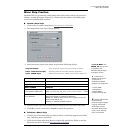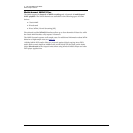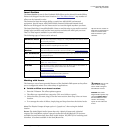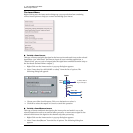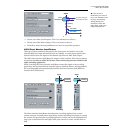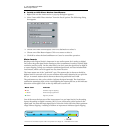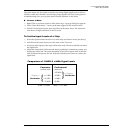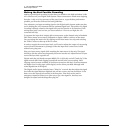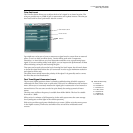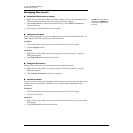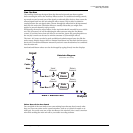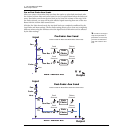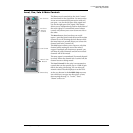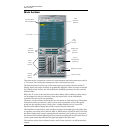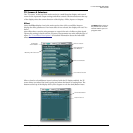
4 - The PatchMix DSP Mixer
Mixer Strip Creation
E-MU Digital Audio System 27
Trim Pot Insert
The Trim Pot Insert allows you to adjust the level of a signal in an insert location. The
trim pot provides up to ±30dB of gain or attenuation and a phase inverter. The trim pot
also has a built-in stereo peak meter after the control.
You might use a trim pot to boost or attenuate a signal send or return from an external
effect, or use it to drive an effect device. Certain effects such as the Compressor,
Distortion, or Auto-Wah are very level dependent and like to see a good strong input
signal. If you are working with a weak signal, you can improve the performance of these
effects inserting a trim pot and boosting the gain.
Trim pots can be used to boost the level of analog line level inputs, but it’s much better
to boost the signal level before the A/D converters in order to get maximum resolution
and signal-to-noise ratio.
The phase invert switch inverts the polarity of the signal. It is generally used to correct
for mics that are wired backwards.
Test Tone/Signal Generator Insert
f Musical Note Freq.
A = 440 Hz
B = 493.88 Hz
C = 523.25 Hz
D = 587.33 Hz
E = 659.26 Hz
F = 698.46 Hz
G = 783.99 Hz
The test tone/signal generator insert is a handy troubleshooting aid which outputs a
calibrated sine wave, white noise or pink noise. This tool, in combination with an insert
meter, allows you to accurately measure the signal gain or attenuation of an internal or
external device. The test tone can also be quite handy for tuning up musical instru-
ments.
The sine wave oscillator frequency is variable from 20Hz-20kHz. The level is variable
from off to +30dB.
White noise is a mixture of all frequencies in the audio spectrum at the same average
level (analogous to white light in the visible spectrum).
Pink noise provides equal power distribution per octave. (White noise has more power
in the higher octaves.) Pink noise and white noise are useful as wideband sound
sources.
Gain/Attenuation
Phase Invert
Meters



